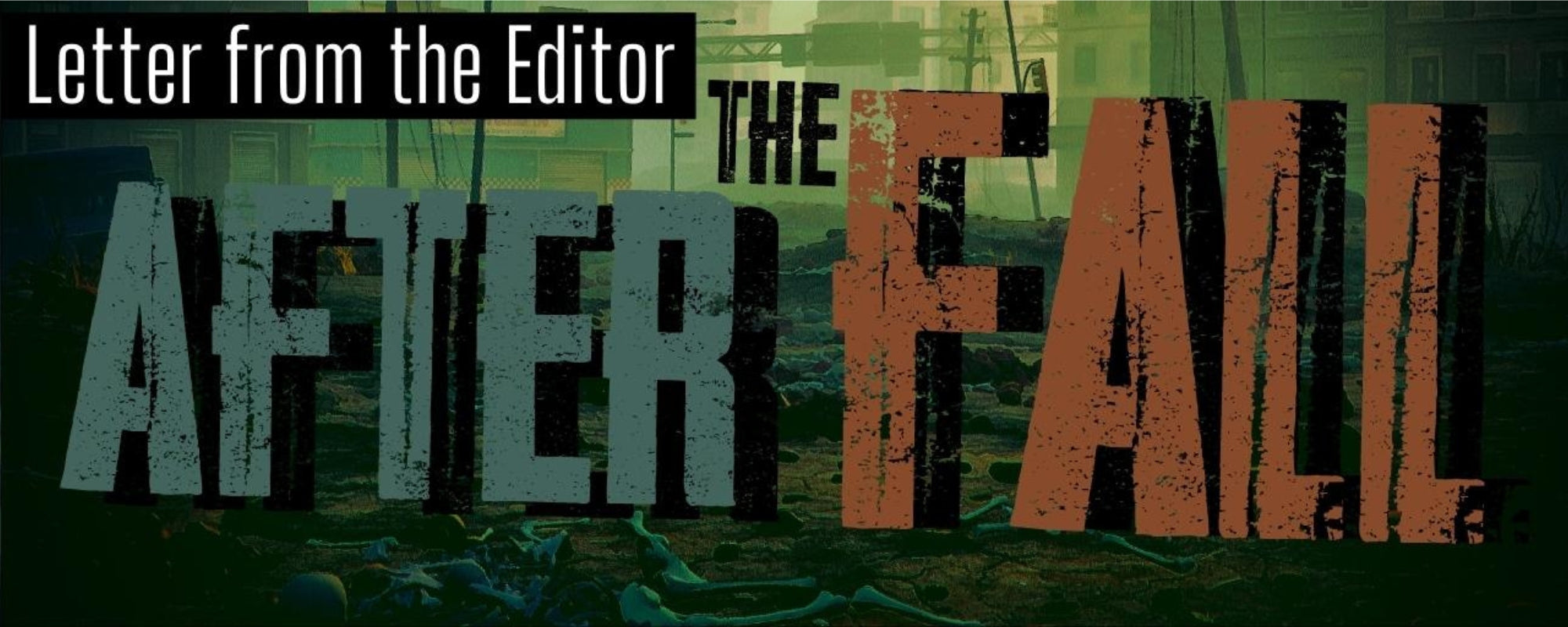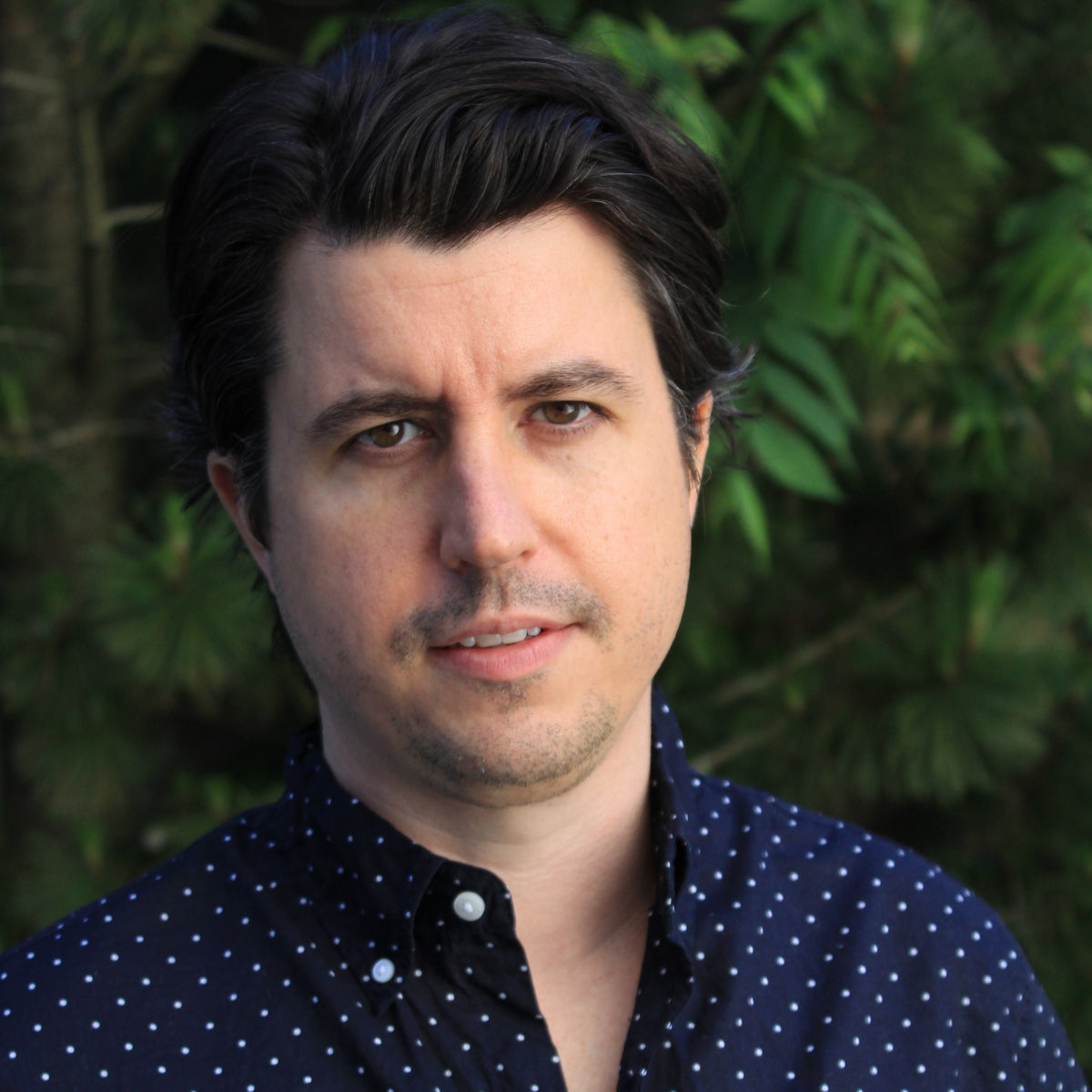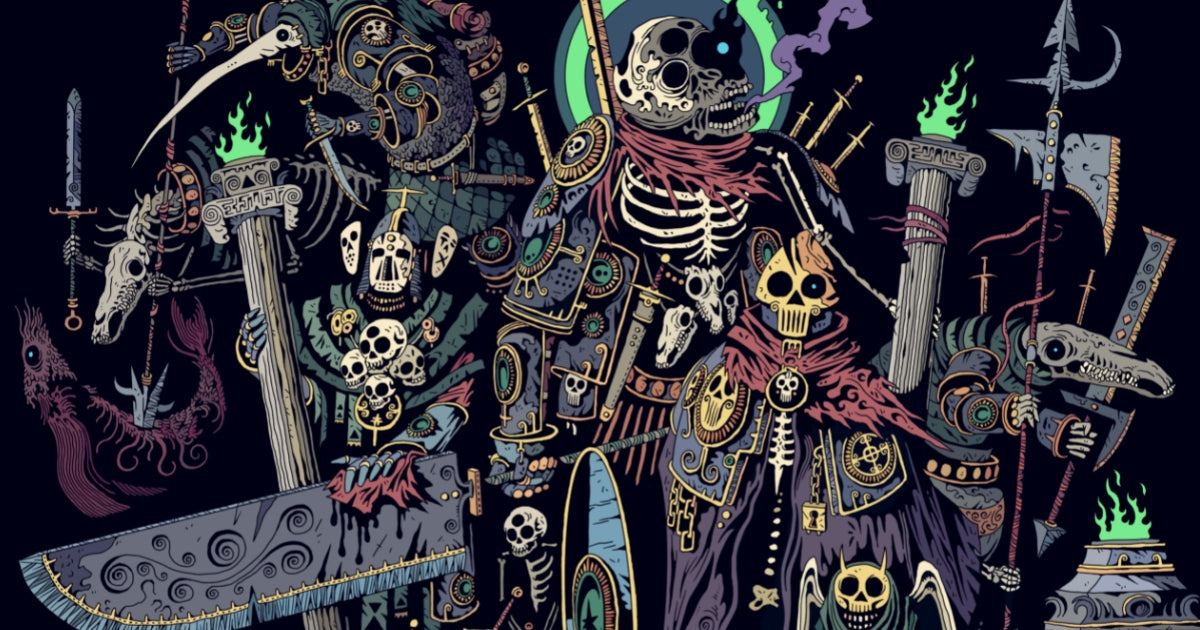

Letter from the Editor: After the Fall
By Rob Carroll
I would like to start this issue’s letter from the editor with an excerpt from one of the stories included in these pages. It’s an elegantly written post-apocalypse tale told through the eyes of an innocent young girl whose intelligence—by modern standards, anyway—remains childish even as she ages. Her wisdom, however, extends far beyond her years.
“She’d once overheard the Doctor tell the Firefighter that she was simple, which was terribly kind of him. There were no such things as Schools anymore, only stories. Everything she knew was from stories, and she’d once heard a story about someone called a Writer who’d written, ‘Simplify, simplify.’ According to the Storyteller, Writers were the most intelligent people of the Old World. Writers had predicted the events that’d led to the Big Whimper. If a Writer had said to be simple, then it was clearly a compliment. The Old World had become too complicated to sustain. Simplicity was everything in the New World.”
Like most people alive today, I want things to be better. I want the world to be more fair, more equitable, more accessible, more loving, more just, more honest, less wasteful, less harmful, less confusing. But sometimes I wonder if such progress is even possible without a complete and total reset of the system we live in currently. The modern world is already far too complex for most people, and complexity cannot simplify, it can only increase or collapse. “The Old World had become too complicated to sustain.”
Therefore, I think it’s time we start asking ourselves if we as human beings even have the capacity to process more complexity without causing serious damage to our mental, physical, and spiritual health. I think many would argue—myself included—that we’ve already crossed the Rubicon in this regard. Just look at the steep increase in rates of depression, anxiety, and suicide, especially among younger demographics in developed nations across the globe.
As I’ve discussed in a previous editor letter, capitalism doesn’t solve problems so much as it creates new industries to profit from them. This isn’t something that’s kept secret, or even something that’s always nefarious. It’s just how any complex system works (grow or die; undoing is not an option), and modern capitalism is incredibly complex. Yes, even toddlers know that sometimes the only solution is to stop and start again, try things a different way, but while this method is great for solving the problem of a crayon that refuses to be shoved back into a crowded box, it’s not so great at addressing large-scale systemic issues that if adjusted or reimagined even slightly can collapse the geopolitical stability of the entire world overnight.
We honestly live in a world so tangled in an ugly web of its own short-sighted creation that one bad actor can cast an entire civilization into chaos. This bad actor can be an imperialist dictator with dangerous delusions of grandeur, or a trillion-dollar financial institution that controls a staggering percent of global assets, global debt, derivatives, commodities, equities, you name it. One bad bet and systemic contagion would wipe out the entire fractional reserve banking system within seconds. Millions of people would starve.
Had the United States government not stepped in during the 2008 financial crisis, exposing the “invisible hand” for the fraud that it is, we would have experienced an even worse financial catastrophe than we did. Unfortunately, true to form, the problem wasn’t solved back then so much as it was quarantined. The architects “fixed” things alright; they rigged the system to make as much money and live as lavishly as possible before the fancy algorithms they genuflect to break and suck all the world’s wealth into a mathematical black hole from which there will be no escape. Plan A for them is to die of old age atop a lonely mountain of money before all the bad stuff happens. Plan B is artificial intelligence, for AI is the only solution to a future society that lacks both wealth and a means to generate it via human labor. Complexity has a hard time cutting out the disease, but it's very good at making sure the disease only affects certain people. Toxic assets can be heaped upon the struggling lower classes while the wealthy remain clean and well-fed thanks to an automated future that now serves them without complaint. In the future, there’s a great risk of a new lower class of humans forming. A class of people so devalued by society, they’re viewed less favorably than machines. One can easily make the argument that we’re already there.
But enough with the doomsday scenarios. Let’s pretend for a moment that we can untie the knot of modern life with no human cost for the great undoing. We’ll reorganize our priorities, live more within our means, and within what nature allows. We only have to tug gently on a loose bit of string and the whole ball of yarn will quickly and gracefully unwind. No harm done. Would we do it? Would we pull the string? Or would we fight to keep the only life we know?
In this issue of Dark Matter, eleven stories imagine the loose bit of string with the power to unravel and then wonder if anyone has the strength to pull it. In “Savior in Steel,” author Zachary Rosenberg asks if it’s even possible to correct a corrupt system without first undoing the corruption by force. In “The King of the Universe Dies Again” by Kay Vaindal, civilization is fragile, but the human spirit is hard to defeat. In “Agua, Cate” by A. P. Thayer, the wilderness of the unknown is sometimes the only way forward. In “Coin-Operated Boy” by Aia Järvinen, the innocent are robbed of a future thanks to our current unwillingness to change, and the grace they show us in return is heartbreaking and powerful. In “Side Effects” by Allan Dyen-Shapiro, a peaceful way forward is difficult to achieve when external factors beyond one’s control work so hard to infect the mind and poison any thoughts of progress. In “It Answered,” author Anastasia Kirchoff shows how there is a fine line between peace and pacification, and how only one of those options values human life. In “The Tent Revival on Galvani H764” by Anj Baker, an attempt to spread the truth is viewed as criminal, and an attempt to make sense of the truth is seen as folly. In “The Seventy-Year-Old Corpse Harvester,” author Naomi Eselojor shows how any attempt to conquer nature is one more step in the wrong direction. In “Citymouth” by Erin Strubbe, we’re reminded that the will to change stands no greater threat than the world upon which it rests. In “Sequoia” by H. G. Watson, we’re told a simple truth—to escape the circumstances that entrap us, we must first acknowledge that we’re trapped. And finally, in this issue’s reprint story, “The Boxing Men” by Ray Daley, we’re shown the best things to do when living in a system that cares so little for us: work hard; love the people around you; and honor their legacy after they’re gone.
Sincerely,
Rob Carroll
Editor-in-Chief
Copyright © 2023 Rob Carroll
The Editor

Rob Carroll
Continue reading

Get Issue Updates
Promotions, new products and sales. Directly to your inbox.


